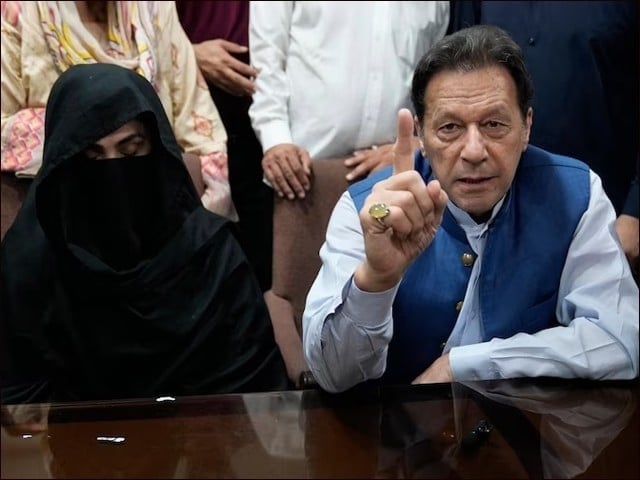Additional district and sessions court Judge Muhammad Afzal Majoka, while presiding over the Iddat Nikkah case on Tuesday, reaffirmed his commitment to a lawful decision, stating, “I will decide according to the law.”
Judge Majoka was overseeing the case against Pakistan Tehreek-e-Insaf (PTI) founding chairman Imran Khan and his wife Bushra Bibi concerning their conviction in the Iddat Nikkah case.
Barristers Salman Safdar and Khalid Yousuf Chaudhry represented the defendants, while Zahid Asif Chaudhry advocated for Khawar Maneka, the complainant.
At the beginning of the hearing, Barrister Safdar argued for the suspension of the sentence, highlighting the excessive number of hearings—over 15 in three months—often delayed by the complainant and prosecution, suggesting a lack of substantial evidence.
Advocate Asif acknowledged Safdar’s legal expertise.
The defense detailed Bushra Bibi’s situation, noting numerous cases filed against the PTI founder and former PM, including the Cipher and Toshakhana cases, culminating in this Nikah case. Safdar expressed sympathy for the complainant and described the extensive legal battles encountered.
He emphasized the importance of addressing both the main appeal and sentence suspension, referencing prior Islamabad High Court (IHC) rulings.
Judge Majoka inquired, “Will you also be filing for suspension on medical grounds?” Safdar affirmed, mentioning Bushra Bibi’s health issues and confinement conditions.
On June 9, Bushra Bibi filed a petition in the IHC seeking suspension of her conviction and sentencing in the Iddat case. Safdar accused the complainant of using delay tactics and highlighted the IHC’s directive to decide the suspension of the sentence within 10 days and the main appeal within 30 days.
The complainant’s counsel, Advocate Zahid Asif, questioned the need for sentence suspension if jail conditions were comfortable. Safdar reiterated his extensive experience with criminal cases and emphasized the unique nature of this case, involving both husband and wife in jail.
He emphasized the case’s complexity and Bushra Bibi’s unique circumstances as a mother of five facing unprecedented charges. “It’s a strange case where both husband and wife are in jail, so who committed fraud against whom?” he maintained.
The court reiterated its commitment to a legally sound decision, emphasizing the need for convincing arguments on key issues, such as inheritance rights if a husband dies during Iddat.
Lawyer Safdar pointed out that even if appeals are pending in district courts, the high court can suspend sentences. He expressed hope that Bushra Bibi would be released before Eid, emphasizing that the same judge who heard the case should decide it.
Safdar argued that the case was filed six years after the alleged incident, without including the complainant’s children as witnesses, and emphasized irregularities in the trial court’s decision, suggesting the case lacked substantial evidence. He concluded by stating, “The accusation is that the Nikah was conducted without completing the Iddat period. If two husbands claimed or there was a case regarding children, it would be understandable,In this case, even the children are not complainants.”
The court then took a 20-minute recess. After the break, Khawar Maneka’s lawyer, Zahid Asif Chaudhry, was set to begin his arguments.
On June 14, the IHC ordered the additional sessions court of Islamabad to decide the appeals of PTI founder Imran Khan and his wife Bushra Bibi against their conviction in the Iddat Nikkah case within one month.




